Opinion
The Dark Psychology of Social Networks
—


If you constantly express anger in your private conversations, your friends will likely find you tiresome, but when there’s an audience, the payoffs are different—outrage can boost your status.
By Jonathan Haidt and Tobias Rose-Stockwell
Suppose that the biblical story of Creation were true: God created the universe in six days, including all the laws of physics and all the physical constants that apply throughout the universe. Now imagine that one day, in the early 21st century, God became bored and, just for fun, doubled the gravitational constant. What would it be like to live through such a change? We’d all be pulled toward the floor; many buildings would collapse; birds would fall from the sky; the Earth would move closer to the sun, reestablishing orbit in a far hotter zone.
Let’s rerun this thought experiment in the social and political world, rather than the physical one. The U.S. Constitution was an exercise in intelligent design. The Founding Fathers knew that most previous democracies had been unstable and short-lived. But they were excellent psychologists, and they strove to create institutions and procedures that would work with human nature to resist the forces that had torn apart so many other attempts at self-governance.
For example, in “Federalist No. 10,” James Madison wrote about his fear of the power of “faction,” by which he meant strong partisanship or group interest that “inflamed [men] with mutual animosity” and made them forget about the common good. He thought that the vastness of the United States might offer some protection from the ravages of factionalism, because it would be hard for anyone to spread outrage over such a large distance. Madison presumed that factious or divisive leaders “may kindle a flame within their particular States, but will be unable to spread a general conflagration through the other States.” The Constitution included mechanisms to slow things down, let passions cool, and encourage reflection and deliberation.
Read the full article in The Atlantic.
___
Jonathan Haidt is the Thomas Cooley Professor of Ethical Leadership.
Let’s rerun this thought experiment in the social and political world, rather than the physical one. The U.S. Constitution was an exercise in intelligent design. The Founding Fathers knew that most previous democracies had been unstable and short-lived. But they were excellent psychologists, and they strove to create institutions and procedures that would work with human nature to resist the forces that had torn apart so many other attempts at self-governance.
For example, in “Federalist No. 10,” James Madison wrote about his fear of the power of “faction,” by which he meant strong partisanship or group interest that “inflamed [men] with mutual animosity” and made them forget about the common good. He thought that the vastness of the United States might offer some protection from the ravages of factionalism, because it would be hard for anyone to spread outrage over such a large distance. Madison presumed that factious or divisive leaders “may kindle a flame within their particular States, but will be unable to spread a general conflagration through the other States.” The Constitution included mechanisms to slow things down, let passions cool, and encourage reflection and deliberation.
Read the full article in The Atlantic.
___
Jonathan Haidt is the Thomas Cooley Professor of Ethical Leadership.
